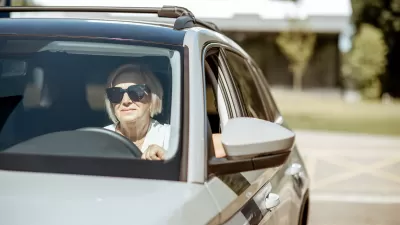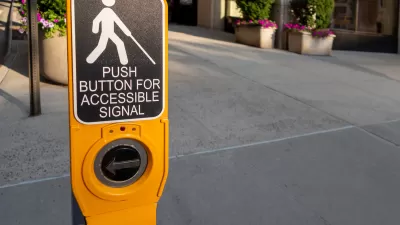Economist Joe Cortright doesn't seem to think so. According to his findings, Americans are driving less, with Millennials leading the way, and this unprecedented trend is here to stay.
Though Americans have been driving less since 2005, predating the Great Recession, "the question of whether the decline in driving marked a sea change in the way we get around or simply reflected a drop in economic activity has been a matter of considerable debate," reports Stephen Miller.
According to findings presented recently by Cortright, that question may now be settled. When charting federal data on vehicles miles traveled (VMT) before and after the last 5 recessions, Cortright finds that the patterns following the most recent recession were exceptional. "In four of the five recessions, driving was either increasing or stagnant in the two years before the economic slowdown, and it quickly picked up steam during the recovery," reports Miller. "The only exception was the most recent recession, which lasted from December 2007 to June 2009. Before the recession, driving per person was dropping. After the recession, driving continued to fall."
Cortright's findings indicate that, "economic and cultural changes are leading to less driving."
"Many people who might otherwise live in the suburbs are choosing instead to live in places where they can get around by walking, biking, and taking transit," writes Miller. These trends are also corroborated by private data, which shows that "congestion in U.S. metropolitan areas has been dropping as well," adds Miller.
FULL STORY: It’s Not the Economy, Stupid: Americans Really Are Driving Less

Alabama: Trump Terminates Settlements for Black Communities Harmed By Raw Sewage
Trump deemed the landmark civil rights agreement “illegal DEI and environmental justice policy.”

Study: Maui’s Plan to Convert Vacation Rentals to Long-Term Housing Could Cause Nearly $1 Billion Economic Loss
The plan would reduce visitor accommodation by 25% resulting in 1,900 jobs lost.

Planetizen Federal Action Tracker
A weekly monitor of how Trump’s orders and actions are impacting planners and planning in America.

Waymo Gets Permission to Map SF’s Market Street
If allowed to operate on the traffic-restricted street, Waymo’s autonomous taxis would have a leg up over ride-hailing competitors — and counter the city’s efforts to grow bike and pedestrian on the thoroughfare.

Parklet Symposium Highlights the Success of Shared Spaces
Parklets got a boost during the Covid-19 pandemic, when the concept was translated to outdoor dining programs that offered restaurants a lifeline during the shutdown.

Federal Homelessness Agency Places Entire Staff on Leave
The U.S. Interagency Council on Homelessness is the only federal agency dedicated to preventing and ending homelessness.
Urban Design for Planners 1: Software Tools
This six-course series explores essential urban design concepts using open source software and equips planners with the tools they need to participate fully in the urban design process.
Planning for Universal Design
Learn the tools for implementing Universal Design in planning regulations.
Caltrans
Smith Gee Studio
Institute for Housing and Urban Development Studies (IHS)
City of Grandview
Harvard GSD Executive Education
Toledo-Lucas County Plan Commissions
Salt Lake City
NYU Wagner Graduate School of Public Service





























